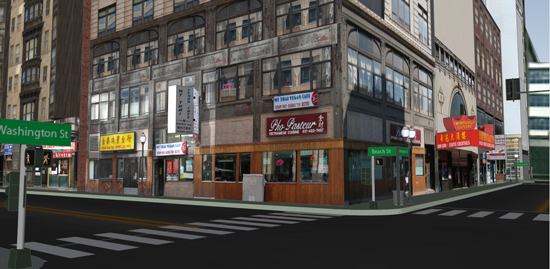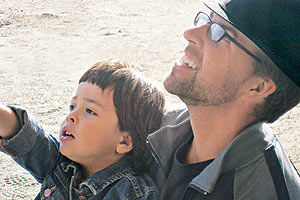This Boston-based project is absolutely fascinating. From today's press release:
Can virtual reality help neighborhoods plan for their future?
Three local groups think so – and they’ve developed a video game that will let residents of Chinatown experience real-time changes to their neighborhood, by navigating a virtual environment.
In an effort to redefine the community planning process and better engage youth in local planning meetings, the Asian Community Development Corporation (ACDC), Emerson College’s New Media program, and the Metropolitan Area Planning Council (MAPC) have partnered to create Participatory Chinatown, a fully-immersive, 3D game that puts residents in the driver’s seat as they shape the future of their neighborhood.
In Participatory Chinatown, community members complete “quests” as one of the game's virtual residents, allowing them to walk the neighborhood streets in someone else's shoes. There’s Hong, a recent immigrant seeking an apartment for his family; and Karen, a fourth-grade student searching the neighborhood for after-school activities. No matter which avatar they choose, game users will experience the multifaceted identities of Chinatown residents.
“We designed this game to attract youth, recent immigrants, and young professionals — those community members who are noticeably missing from most community planning meetings,” said Janelle Chan, Interim Executive Director of the Asian Community Development Corporation in Chinatown. “Participatory Chinatown recognizes the important role that young people often play as translators for their immigrant parents and other community members, and it also encourages them to actively express their own views during planning processes.”
Game-based meetings will use a combination of physical deliberation, virtual interaction, and Web-based input to provide residents with an entryway into serious community decision-making. The results of these meetings will feed into the Chinatown “master planning” process.
To help lower cultural and language barriers, local youth will serve as informal interpreters and technology assistants. The game is bilingual, available in both English and Chinese.
“By getting people out from behind their own concerns, if only for a few minutes, we hope to create the kind of empathy and civic mindedness that is ideal for providing valuable input into a planning process—and also for developing trust among stakeholders,” said Eric Gordon, Co-Principal Investigator and assistant professor of new media at Emerson College.
“The emphasis isn’t just on the computer simulation, but on the process and the deliberation that happens in between gaming sessions,” said Holly St. Clair, Director of Data Services for the Metropolitan Area Planning Council (MAPC). “Our hope is that when people have a collective experience through the video game, and then talk about it, they’ll gain a better understanding of the complexitites of Chinatown, and then they can plan together for the future of their area.”
You can learn more here.









